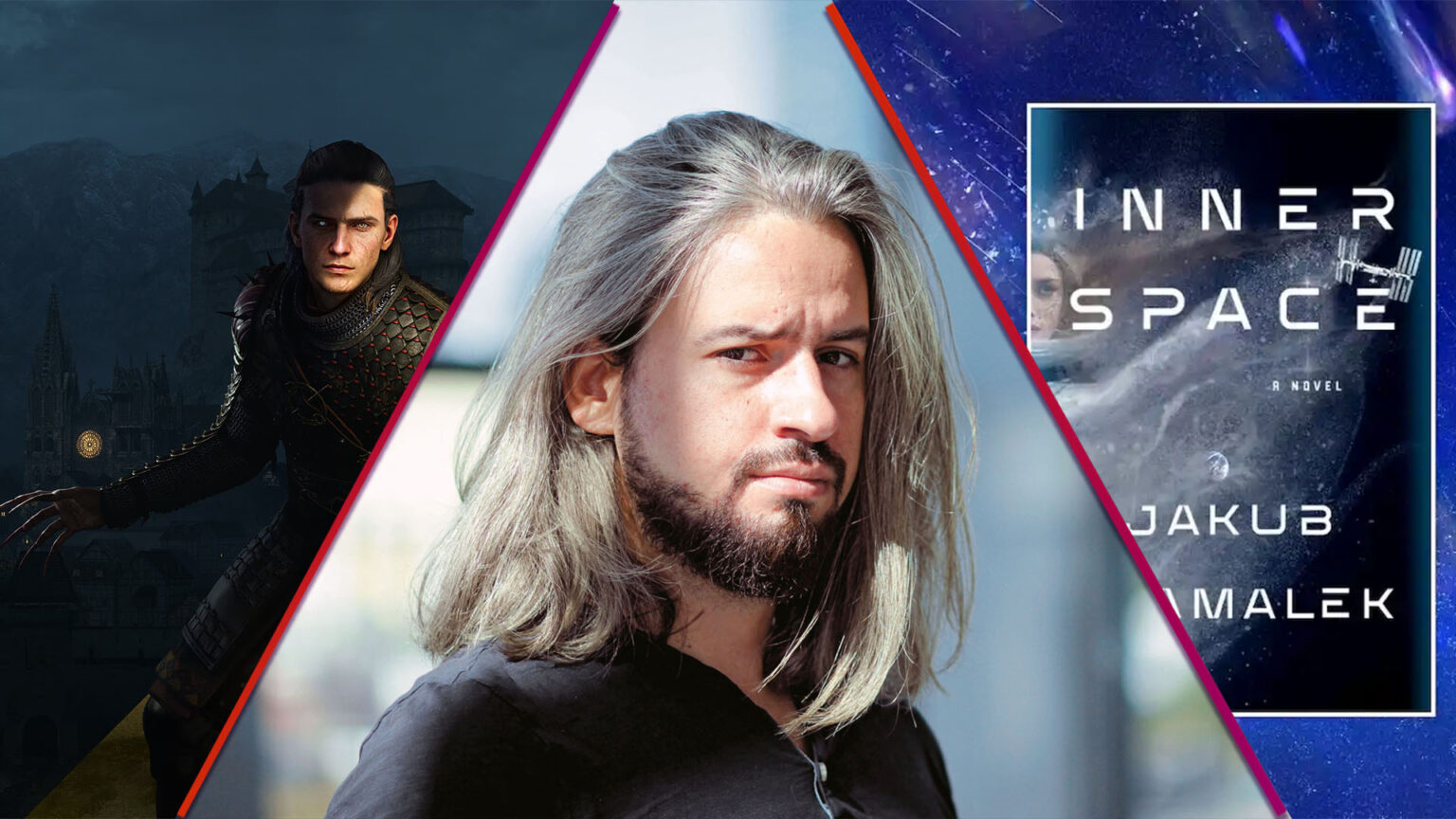In an exclusive interview for Virtualni Kutak, we spoke with Jakub Szamalek, an award-winning writer, screenwriter, and one of the key narrative voices in the world of modern video games. Known for his work on titles such as The Witcher 3 and Cyberpunk, Jakub is now taking on new creative challenges: as lead narrative designer at the independent studio Rebel Wolves and their upcoming title, The Blood of Dawnwalker, and as the author of Inner Space, a novel released this summer.
In this interview, Szamalek takes us behind the scenes of a mystery set aboard a space station, shares who rekindled his fascination with the cosmos, reflects on building layered characters, the role of humor, and the political nuances of science fiction, while also giving us a glimpse into a dark, vampire-infested medieval fantasy world and the moral complexity of his latest game. And, let’s start!
Virtualni Kutak: First and foremost, congratulations on the release of your new novel “Inner Space” (Publisher Harper Collins, available from 15th July 2025). I just finished the book in a couple of days — and I couldn’t rest until I reached the end! The invigorating mix of mystery, action, and tension set against the backdrop of a space station was so refreshing. I loved the unique setting and how you brought the astronauts’ world to life so vividly. I’m curious — how long did it take you to research space stations and astronaut work? And when did your initial interest in space begin?”
Jakub Szamalek: Oh, it took a few years! I read lots and lots of books (one of my favourite things to do anyway) – especially memoirs of astronauts, flight controllers, and engineers. I spent countless hours sifting through NASA’s many websites, looking for technical manuals and protocols, and watching videos recorded in space. My goal was to describe the experience of being aboard ISS as realistically – and convincingly – as possible.
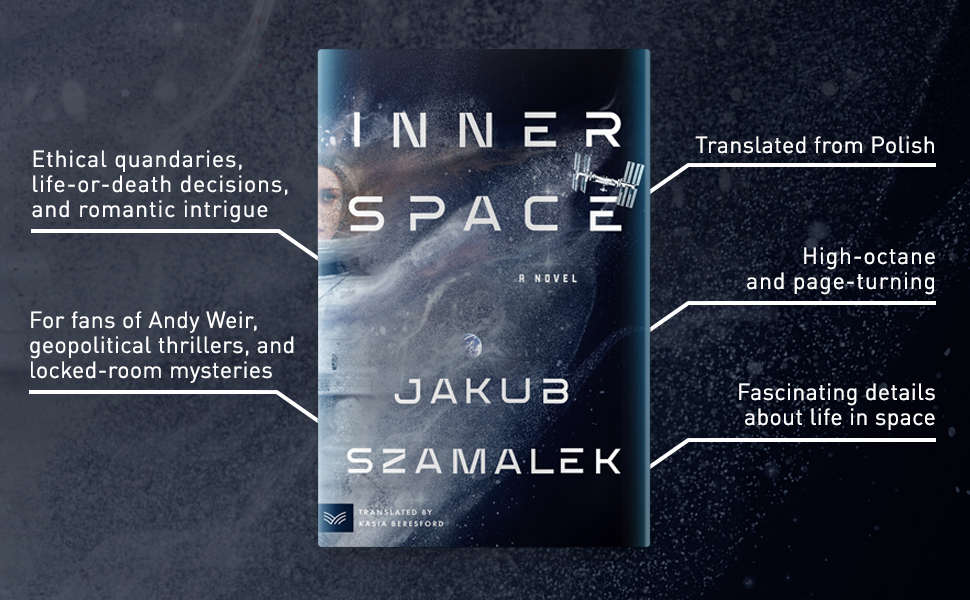
And it all started with my daughter, Matylda. When she was a small kid, she was fascinated by space, the cosmos, and so on, and peppered me with questions about it all. I quickly realised how little I know about the universe all around us – and that I lost the beautiful sense of wonder kids have. So I started reading about space – and space exploration – and the more I read, the more I wanted to know.
Then, one summer, we took Matylda to the Space Museum in Toulouse, where you can step inside a life-size replica of the MIR space station. The moment I walked inside, I felt claustrophobic. The space was tight, wires and buttons everywhere, tiny windows, lots of sharp edges. And it struck me – this is where people want to go to so badly? And spend months, stuck in a metal tube, surrounded by lethal void? Why? What draws us to the stars? That’s when the idea for the book started taking shape.
VRK: Although this is a whodunnit, you’ve packed quite a memorable cast of characters. Especially the main cast: Lucy, Nate, Ayers, Anton, Lafayette, Ezra – they are all distinct from each other. Usually, astronauts feel distant or larger-than-life to the general public. But they all have a real sense of humanity, with their own virtues and flaws. Now that the novel is out, which character was most interesting to write about and develop?
Jakub: I probably enjoyed writing Lucy the most. There’s so much conflict within her, so much tension. Should she follow her orders or follow the requests of her scheming superior? Should she try to incorporate the Russian crewmembers into her decision-making – to build trust – or cut the ties? Was she right to prioritise her ambitions, or should she have focused on her loved ones instead? I think all these dilemmas make her a really interesting protagonist.
VRK: Inner Space touches on a quite realistic political theme — the ongoing space rivalry between the US and Russia. You described a variation on our current reality, of how mistrust, bias and capitalism often hold back human progress. Do you think that one day we’ll move past those and boldly go where no one has gone before?
Jakub: Ah, wish I knew. I fervently hope that the optimism of the 90s wasn’t just naivete – that we can, after all, work together for the greater good. But looking around these days, it’s hard to see how we’d get there.
But even though the ISS won’t last forever, it’ll still remain proof that collaboration between former foes is possible – and as such, it’s tremendously important. To me, the fact that it was built – and remained in operation for so many years, despite all the geopolitical tensions – is more significant and awe-inspiring than all the scientific research that happened there.

VRK: Even if the story is a high page turner, you’ve imbued it with a lot of humour. When you were writing it, did you think that would be a proper buffer to give the readers a bit of respite from all the drama and high stakes?
Jakub: Yes, I enjoy mixing humour with solemnity, building up tension and then releasing it with a good joke. Hopefully, the end result is a book that keeps you hooked but every once in a while makes you smile, too.
VRK: Coming from an academic background, can you divulge your processes when it comes to writing? How do you approach research? Do you go deep diving into details to make them further accessible and engaging to the general readers, or do you also think of the hardcore fans of realistic science-fiction and cater to them as well?
Jakub: As a one-time academic, I really enjoy reading up on – and trying to understand – complex topics, including technology. Once you get through all the technical jargon and put the puzzle pieces together, the picture you get is fascinating. I tried to share it with my readers, but make it as approachable as possible. My hope is that even those readers who usually skim over technical language will find the ISS a marvel to behold.
VRK: When you presented your Inner Space script to your editor, did they give you insightful advice on anything should be left out of the final novel?
Jakub: Of course – I received lots of helpful comments from my editors, both for the original Polish and for the translations (inner space comes out in French, too, this fall). With the English edition, the focus was on making dialogues sound believable to the Anglophone audience. There’s a lot of nuance which I wasn’t able to express in the original Polish.

VRK: Can you tell us more about what it looks like to work with your translator, Kasia Beresford? Was it a collaborative experience, where you both had to go back and forth, because there are a lot of American sayings that sound very local?
Jakub: Kasia was unbelievably thorough. She read every sentence, every word with a critical eye and flagged up even the tiniest inconsistencies, to the extent of checking actual ISS blueprints to make sure my descriptions are true to the fact!
Together with my editor at Harper Collins, Gabriella Page-Fort, we did our best to make sure the Americans in our story really sound American – and unlike the Russians, for whom we developed their own distinctive style of speech.
VRK: Since you had one of your works already adapted into a movie, would you like this to happen for Inner Space as well at one point? If that did happen and you had carte blanche to choose the director and actors, what would your picks be?
Jakub: Oh sure, I’d absolutely love that! I think Inner Space could easily be adapted into a movie. When it comes to directors, I’m a big fan of Denis Villeneuve – each and every frame of his movies is a piece of art in itself. As for actors, I think Natalie Portman would make a great Lucy, and Zach Quinto would be ideal for Nate. Hollywood, call me any time.
VRK: After you’ve left your work at CD Projekt Red, you’ve joined a brand new studio, Rebel Wolves, which was co-created by your colleague Konrad Tomaszkiewicz. How does it feel to be the main lead narrative at the helm of the freshly made independent studio? Do you feel that you will have even more leeway to experiment and tell stories without constraints?
Jakub: Oh, it’s been a great experience so far – and quite a ride! We had to learn a lot, and fast, about the business side of things. Building a company, and a new IP, and a new game all at the same time has been an interesting challenge for sure. And yes, it’s great to have so much control and freedom to experiment!
The feature I’m most excited about is the idea of the narrative sandbox. What we mean by this term is an open-world game where there’s no distinction between side quests and main quests – there’s just the starting point and a goal you are supposed to reach. How you do it it’s entirely up to you. There are multiple storylines you can decide to engage with, but you may as well skip them all and still complete the game.
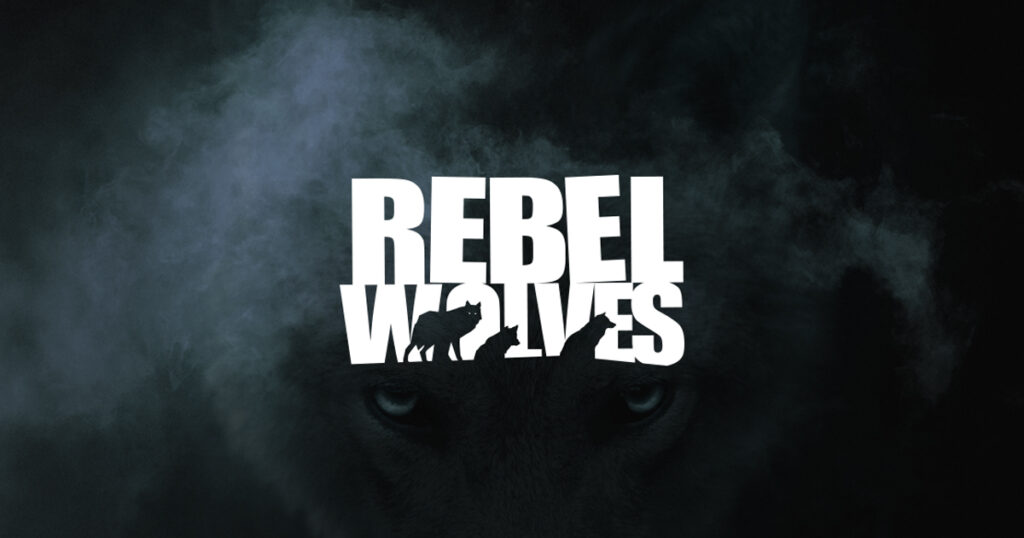
VRK: The Blood of the Dawnwalker looks like an interesting title. I can only assume that a lot of local legends and beliefs from Poland and works of Brother Grimm (there are some sprinkled in The Witcher 3, and a reference within Inner Space) factored in to build this believable medieval world. Was this idea already cooking a while ago, and can you lead us through how it was formed? Would you divulge how Coen, the main character in Dawnalker, differs from Geralt and V?
Jakub: I wrote quite a few games with grizzled, experienced protagonists, who’d remain unfazed even in the face of danger. And they were all fantastic to write, but this time, I thought it’d be cool to try creating a character who’s new to all this – who can get overwhelmed, who can express wonder and befuddlement.
Another interesting facet of our hero is that he’s quite emotionally mature. He reads people well, picks up on subtleties and subtext hidden between the lines. It makes Coen really fun to write and I hope gamers will appreciate it, too.
VRK: The gameplay video showed that the game will make some, let’s say, radical changes by implementing new ways of roleplaying and gameplay. And that there will be a time limit. Do you think returning to the old ways when games had time limitations, such as legendary Fallout, and pushed players to prove their prowess, is making a comeback?
Jakub: We’ll see, I certainly wouldn’t mind! In our case, the introduction of the time limit comes from the observation that most open-world games have issues with presenting stakes believably. You’re told to take care of some urgent issue, but the game then patiently waits as you’re running around picking up herbs for crafting or playing minigames. And so you stop treating NPCs and whatever issues they have seriously – you know it’s only make-believe.
We wanted to tackle this issue, find a way to up the ante – and so, increase players’ immersion and ultimately, satisfaction. Introducing time as a resource seemed like an interesting direction to explore.
I’d like to use this opportunity to emphasise, though, that Dawnwalker won’t have a real-time clock – time will only progress as you’re completing quests or engaging in particular game mechanics. So you don’t have to rush as you explore, or panic when someone calls you as you play – you can step away from the game and nothing will happen. But when someone asks you for help, you need to ask yourself – Do I care enough to spend time to deal with this? And this adds another layer of non-linearity, because choosing to ignore someone will have consequences, too.
VRK: About the world of The Blood of Dawnwalker, can you guide us on how the idea was formed for it? From the video presentation, it seems that mainly middle-aged Europe had a great influence.
Jakub: Yes, we drew inspiration from the history and culture of the Middle Ages – but let me put emphasis on the “inspiration”. This isn’t a historical game; we aren’t trying to faithfully recreate any particular place or events. Rather, we pick and choose historical elements we need to create a rooted, intriguing world. The 14th c was such a dark moment in European history – with the Little Ice Age, plague, endless wars – that adding monsters to the mix didn’t seem like such a big stretch.
VRK: Vampires are the main antagonists in the game; the interesting part is that they are the feudal lords within Dawnwalker. I know that it’s hard to see them outside of the black and white presentation of their beastly nature, but will there be shades of grey and even some humanity in Coen’s antagonists?
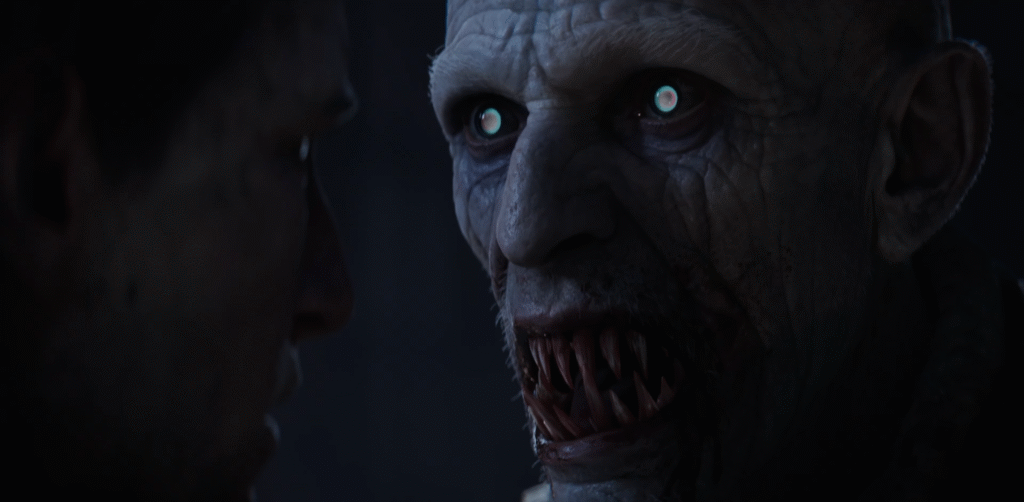
Jakub: We’re definitely interested in telling nuanced, thought-provoking stories, so you can expect our antagonists to be complex characters too. They have their own reasons and motivations for doing what they do – and players will have many ways of responding to them. I wish I could tell you more – but I don’t want to spoil the fun!
VRK: Did you deep dive into the European lore about vampires, or did you take something new from the general pop culture?
Jakub: We cherry-picked bits of actual Eastern European folklore with more established pop culture pertaining to vampires. We wanted them to feel both familiar – everyone loves vampires! – and original at the same time. We put quite a bit of effort into developing complex lore around them, and a lot of it will be communicated between the lines. So as you play the game, keep your eyes peeled, pay attention to detail – and you’ll be rewarded for it.
VRK: When you take a look through your lustrous career, which of these many moments we’ve discussed made you proud of being a storyteller?
Honestly, I feel more lucky than proud – lucky that I make a living by doing what I love and care deeply about. So a big thank you to all gamers who picked up the games I worked on and all readers who’ll, hopefully, reach for “Inner Space” – I owe you one!
VRK: Can you name your all time four favourite books or writers and movies, or video games?
Jakub: Sure!
Books – “Name of the Rose” by Umberto Eco, “Cuckoo’s Egg” by Cliff Stoll, and, of course, the Witcher saga.
Movies – “Memento”, “The Truman Show” and “In the Loop”.
Games – oldies but goodies hold a special place in my heart – “Heroes of Might and Magic III”, “Jagged Alliance 2”, “Might and Magic VI”. I also love “Slay the Spire” and “FTL”.
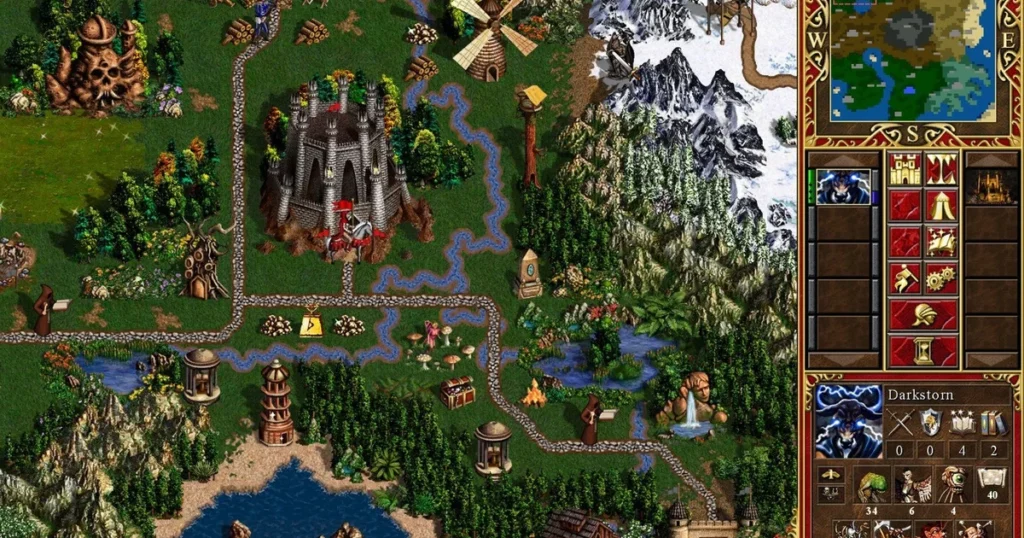
VRK: For the final question, what would you like the public to gain from reading the book you’ve published and from the video games you’ve built throughout the years?
I’d like you to say “Huh. Interesting.” I find it so easy to take the world for granted, just skim on the surface. In all my writing, I’m sharing what fascinates me – be it the marvelously complex technology behind the ISS or vampire lore woven into “The Blood of Dawnwalker”. And I hope you find it interesting, too.
Whether you’re unravelling a mystery among the stars in Inner Space, or fighting vampiric overlords in The Blood of the Dawnwalker, one thing is certain: Szamalek will make you pause and say: “Hmm. Interesting.” And that, ultimately, is what he hopes to achieve — to help us rediscover a sense of wonder for the world, in all its layers, both real and imagined.
Inner Space Novel is available now to purchase on Harper Collins Publishers Website, Amazon, and many other storefronts.
The Blood of Dawnwalker is set to be released in 2026 for PlayStation 5, Xbox Series consoles and PC. You can check the game on the official website and Wishlist it on Steam!

